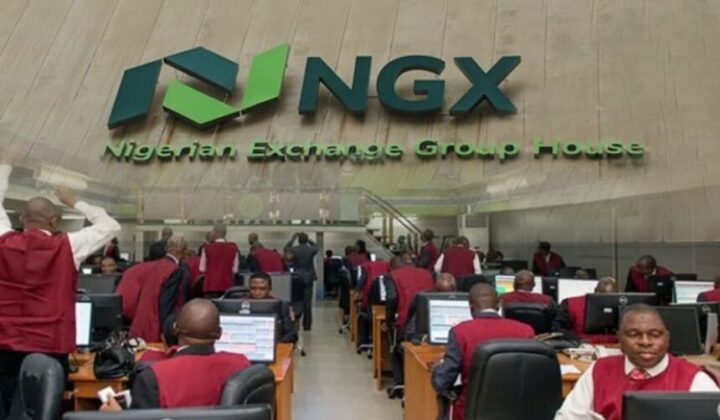Nigeria’s capital market recorded a strong performance in the first half of 2025, posting a 16 percent growth amid increased investor participation and renewed confidence in equities and other financial instruments listed on the Nigerian Exchange Limited. The surge, which pushed the total value of listed securities to ₦126.73 trillion as of June 30, reflects growing optimism around macroeconomic reforms, monetary policy direction, and corporate earnings.
This growth trajectory was confirmed in a half-year review released by the Nigerian Exchange Group, which noted that both the equities and fixed income markets saw notable expansion during the first six months of the year. According to the report, the market capitalization rose from ₦109.27 trillion at the beginning of January to ₦126.73 trillion at the end of June, marking a ₦17.46 trillion increase. Analysts attributed the upswing to a combination of policy clarity, improved regulatory environment, and increased participation by domestic institutional and retail investors.

The positive market sentiment was further bolstered by relative stability in foreign exchange rates and the implementation of economic reforms aimed at boosting investor confidence. These include the ongoing liberalization of the foreign exchange market, improved coordination between fiscal and monetary authorities, and a more business-friendly regulatory landscape. As a result, investors were more inclined to hold local assets, while corporate entities took advantage of the improved conditions to raise capital through equities and debt instruments.
A number of key sectors contributed to the capital market’s robust performance. Banking stocks, industrial goods, consumer goods, and telecommunications companies all saw increased investor interest, driven by strong earnings reports, dividend announcements, and strategic growth initiatives. The financial services sector, in particular, remained a dominant force in trading activity, with several Tier-1 banks delivering strong half-year financial results that exceeded market expectations.
In addition to equities, the fixed income segment of the market also posted impressive numbers. The listing of new corporate and sovereign bonds, along with increased investor appetite for fixed-income securities, added to the overall market capitalization. Government-backed instruments remained popular among risk-averse investors seeking stable returns, while corporate bonds from blue-chip firms gained traction due to improved credit ratings and enhanced transparency in disclosures.
Furthermore, the rise in capital market activity is being seen as a reflection of renewed domestic investor participation, following years of cautious sentiment due to economic volatility and uncertainty. The introduction of more accessible trading platforms and digital investment tools has helped attract a new generation of retail investors, many of whom are now actively engaging with the stock market for the first time. This has added depth to the market and improved overall liquidity.
Another significant development has been the growing involvement of institutional investors such as pension fund administrators and insurance companies, who have increased their equity exposure in response to relatively stable inflation and interest rate outlooks. With returns on government securities moderating in recent months, many institutional players are diversifying into equities to enhance portfolio performance and meet long-term obligations.
Capital market stakeholders have praised the NGX for its role in sustaining transparency, innovation, and investor protection. They pointed to ongoing market reforms, such as the adoption of the new NGX Technology Board and plans to deepen the derivatives market, as signs that the exchange is positioning itself as a more competitive and globally aligned platform. In addition, the introduction of more robust corporate governance frameworks and continuous listing obligations has enhanced investor confidence and accountability among listed firms.
Despite the impressive growth recorded in the first half of the year, analysts have advised caution as the second half may present different dynamics. Some warn that global economic uncertainty, potential interest rate changes by the U.S. Federal Reserve, and continued geopolitical tensions could create volatility in emerging markets, including Nigeria. Nonetheless, they remain optimistic that the Nigerian capital market will remain resilient if macroeconomic indicators continue to improve and reforms are sustained.
The NGX leadership has reaffirmed its commitment to market development and inclusiveness. In a statement, the exchange noted that it would continue to prioritize the introduction of innovative products, attract more listings from high-growth sectors, and promote financial literacy among retail investors. It also promised to enhance its regulatory oversight and stakeholder engagement, ensuring that the market remains vibrant and reflective of the broader economy.
As of mid-2025, Nigeria’s capital market appears to be on a solid path to recovery and growth. With total listed instruments valued at ₦126.73 trillion and investor sentiment trending positively, there is a strong foundation for further expansion in the months ahead. While challenges remain, the momentum built in the first half of the year provides hope that the capital market will play an increasingly central role in Nigeria’s broader economic transformation.
Support InfoStride News' Credible Journalism: Only credible journalism can guarantee a fair, accountable and transparent society, including democracy and government. It involves a lot of efforts and money. We need your support. Click here to Donate
